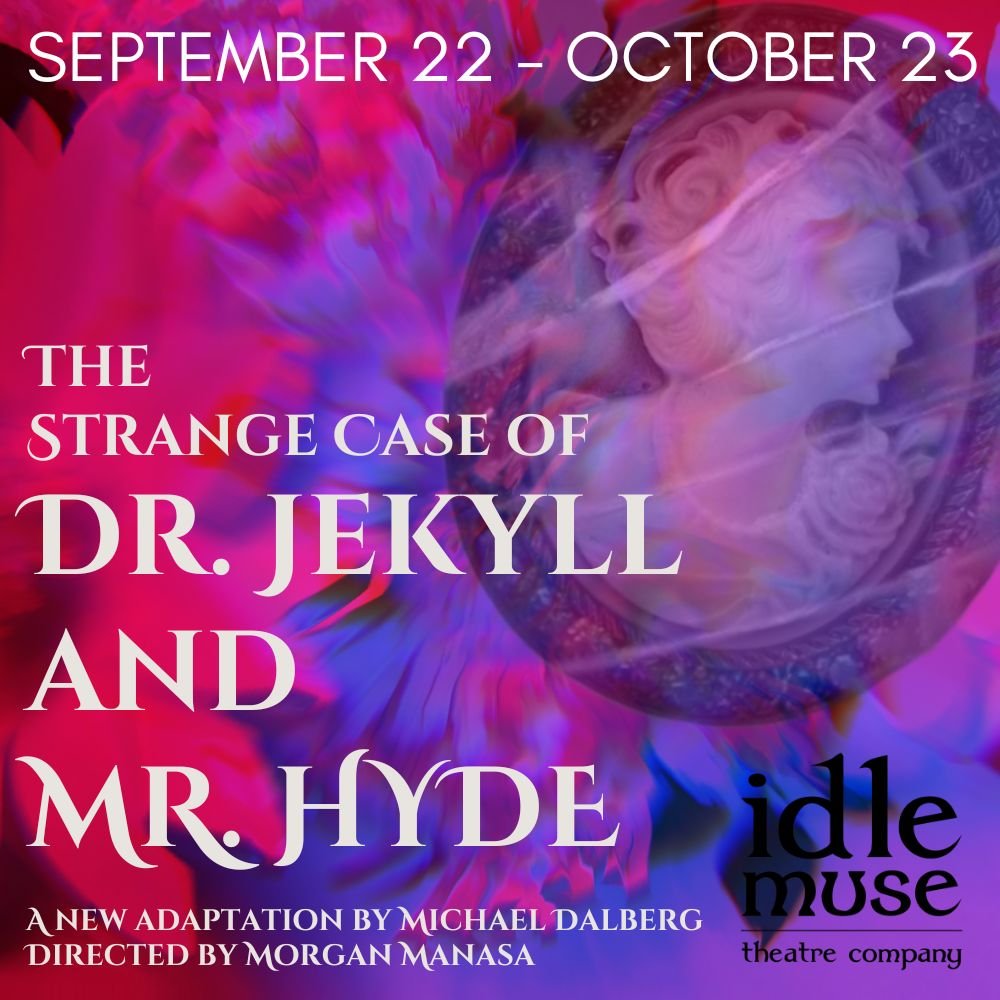
 [rating=5]Michael Dalberg’s quick-witted and crafty adaptation of “The Strange Case of Dr. Jekyll and Mr. Hyde” is diabolically delicious. Originally penned by Robert Louis Stevenson in 1886, the story combines the promise of scientific discovery with that of horror and science fiction. In the original, Dr. Henry Jekyll believes that his colleagues have cast doubt on his intellectual capacity and have minimized his scientific accomplishments in the field of medicine. But he can show them up and prove them one better! By drinking a potion that he had developed in his laboratory, Dr. Jekyll could turn his shadowy alter ego into flesh in the personality of Mr. Edward Hyde—and he could decommission him at will by taking an antidote. Now… what makes this world premiere production and this adaptation so good is that Dalberg re-envisions Dr. Jekyll (Brandi Jiminez Lee) as a woman. Adding a gender focus to the storyline intensifies the main character’s motivation—and seeming justification—for having her evil counterpart Mr. Hyde (Jack Sharkey) kill all those who have hurt her in some way throughout her personal and professional life.
[rating=5]Michael Dalberg’s quick-witted and crafty adaptation of “The Strange Case of Dr. Jekyll and Mr. Hyde” is diabolically delicious. Originally penned by Robert Louis Stevenson in 1886, the story combines the promise of scientific discovery with that of horror and science fiction. In the original, Dr. Henry Jekyll believes that his colleagues have cast doubt on his intellectual capacity and have minimized his scientific accomplishments in the field of medicine. But he can show them up and prove them one better! By drinking a potion that he had developed in his laboratory, Dr. Jekyll could turn his shadowy alter ego into flesh in the personality of Mr. Edward Hyde—and he could decommission him at will by taking an antidote. Now… what makes this world premiere production and this adaptation so good is that Dalberg re-envisions Dr. Jekyll (Brandi Jiminez Lee) as a woman. Adding a gender focus to the storyline intensifies the main character’s motivation—and seeming justification—for having her evil counterpart Mr. Hyde (Jack Sharkey) kill all those who have hurt her in some way throughout her personal and professional life.
The reimagined Dr. Jekyll has to play the part of the demure female, who—despite her sexual cravings—is not supposed to acknowledge or express any sexual feelings, as was common among respectable women during the Victorian era. While that is disconcerting enough, what makes things worse is that she has grown weary of not being taken seriously enough as a medical doctor and research scientist and has to defer to her male colleagues at the university simply because of her sex. She is tired of having by her peers pat her head or jerk her around or deny her a career and the income and prestige that goes along with it simply because she was born a woman. But then there is also the physical and sexual abuse that her father took out on her previously when he did not receive his anticipated seat as a member of Parliament. Despite this compounded adversity, Dr. Jekyll indeed lived up to, if not surpassed, expectations for her intellectual promise. It is a marvel that she has had the patience, skill, and fortitude to create a potion making the evil side of her personality real. Still retaining her moral sense, she nevertheless disparages her creation of Mr. Hyde but on another level, she is thrilled with what she has accomplished. She has given herself the permission and power to destroy. She can kill off the people who once spurned her or thought she wouldn’t amount to anything or who trivialized her work.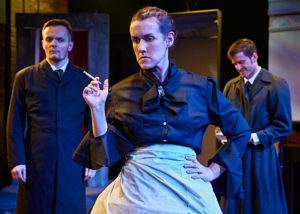
Her counterpart Mr. Hyde, interestingly enough, fully retains his masculine attributes. This symbolizes the layering of male and female energies within the same person. Since people generally operate as part of a continuum of being male, female, and nonbinary, having a part of a woman’s personality being depicted as that of a man allows us to examine Dr. Jekyll’s psyche on a deeper level. Perhaps what is most important for our purposes here is that the portrayal of a divided self as two distinct characters within a drama poses a very real challenge when it comes to stage direction.
Hence, the directing by Morgan Manasa is genius itself. I adored how Manasa increased and decreased the distances between Jekyll and Hyde depending on the amount of antagonism between the two. When Hyde becomes unhinged and yells at Jekyll, they remain at a large physical distance in accordance with the huge psychological distance of their conflict. When they are not at odds with each other, their physical distance is a lot closer. It is then that both sides of Jekyll’s personality are bound together sexually, especially when they become lovers and almost twins. But the most captivating part of the directing is when Jekyll and Hyde are placed on either side of one of Jekyll’s lovers, such as when Gabriel John Utterson (Shane Richien) is involved in a threesome—but from the character’s perspective, there is only one intimate partner. Hence what the audience witnesses is quite interesting psychologically. We see the fusion of lust and sexual desire between Jekyll and Hyde plus the combination of heterosexual and gay sex regarding her various sexual exploits.
While all of the acting was fantastic, a special shoutout should be made to Brandi Jiminez Lee, who holds the show together with her poise and inner strength. Other characters of note are Dr. Hastie Lanyon (Joel Thompson), Sir Danvers Carew (understudy Ross Compton), Enfield, (Ian Saderholm), and the maid (Hanna Beth Mitchell).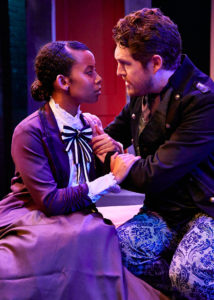
My only quibbles are minor ones. First, I would have changed Dr. Jekyll’s first name to Henriette or Henrietta, rather than Henri. Since the gender shift is made complete by referring to the doctor as a woman and using the pronouns she, her, and hers, addressing Jekyll as Henri is much too contemporary for the time period; a more traditional-sounding woman’s name might have worked better. It is enough of a stretch to cast a woman into the title role (and a black woman, no less, given the prejudices of late 19th century Britain). But to prove that a woman is powerful does not require giving her a gender-neutral or male-sounding name. My second quibble is that on occasion there is too much verbiage (especially among the minor characters) when they feel the need to explain themselves and their motivations for action, especially with regard to their sexual activity.
Costumes could not have been any better! Congratulations to Jessie Gowens for such brilliant and appropriate design! Every single garment—from the finely tailored suits that the men wore to the purple dress and the other costume changes worn by Dr. Jekyll—are made with tender, loving care and great exactitude, befitting the late 19th century. My favorite was the double-breasted long coat worn by the character of Mr. Hyde; it was extraordinary and in keeping with the “hidden” theme. I also loved seeing the ruby red shoes worn by the Sir Carew, making him extremely noticeable on death, without anyone having to lift the cover, thus allowing Compton to play the part of Poole at the same time. Scenic designer Stina Taylor and properties designer Tristan Brandon have created a setting which befits this small stage and which is apt for the time period. Laura Wiley’s lighting and projection design is equally well-suited, plus it is very creative with its bold colors as appropriate. Intimacy designer Samantha Kaufman has nicely created the sequences having to do with sexual contact, while fight choreographer Libby Beyreis has nicely developed the sequences having to do with brutality and killing. L.J.Luthringer has done a fine job with the sound and music design.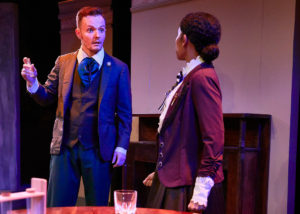
The current incarnation of this classic horror story works exceedingly well. It is entertaining and imaginative. With Dr. Jekyll being such an extremely authentic character, perhaps one could make the argument that Hyde isn’t so evil after all and that the doctor’s nasty associates have each gotten their just deserts. Although we are warned in advance that “…this performance will feature violence, sexual violence, suicide, and adult themes and situations”, the scariest part of the show, however, is that “We all have a shadow.” Sigmund Freud might have couched this script in terms of the basic drives that people in polite society generally try to repress, having to do with sex or sexual desire (Eros) and violence or the destructive force (Thanatos). Accordingly, Mr. Hyde may be hiding within every one of us.
Idle Muse Theatre Company’s world premiere of “The Strange Case of Dr. Jekyll and Mr. Hyde” is playing through October 23, 2022, at the Edge Off-Broadway Theater, 1133 W. Catalpa Avenue, in Chicago.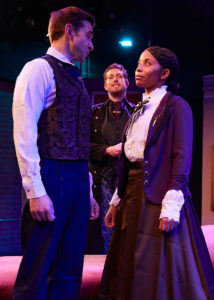
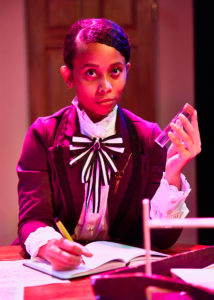 General admission tickets are $20.
General admission tickets are $20.
$15 for students and seniors.
$10 for Thursday Industry Nights.
Performance schedule:
Thursdays, Fridays, Saturdays – 8:00 p.m.
Sundays – 3:00 p.m.
To purchase tickets or for more information, go to http://www.idlemuse.org/ or phone the Idle Muse Theatre Company box office at 773-340-9438.
COVID policy: Proof of vaccination is necessary and masks must be worn at all times when not actively eating or drinking. COVID rules are evolving and subject to change at any time.
To see what others are saying, visit www.theatreinchicago.com, go to Review Round-Up and click at “The Strange Case of Dr. Jekyll and Mr. Hyde”.


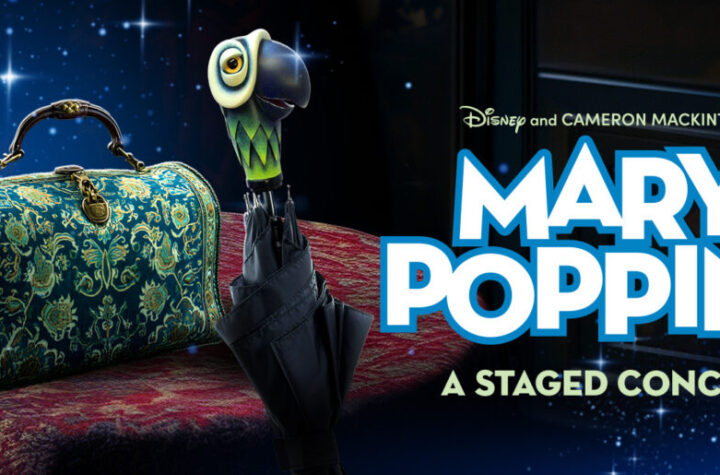
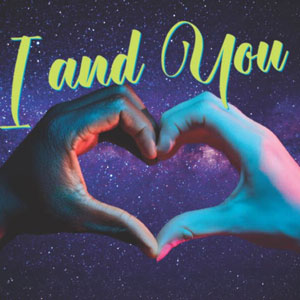


More Stories
“Mary Poppins : A Staged Concert” reviewed by Julia W. Rath
” I and You”
“Johnny Cobweb” reviewed by Mark Reinecke